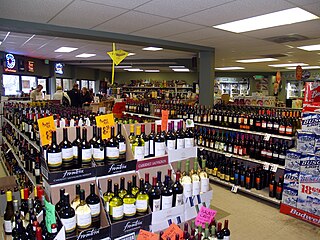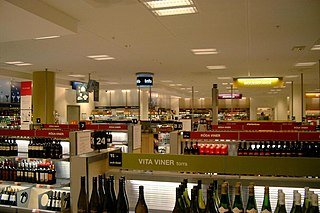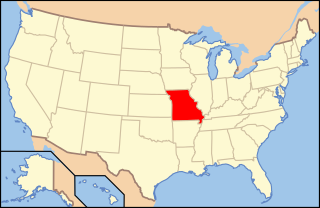Related Research Articles

The Liquor Control Board of Ontario (LCBO) is a Crown agency that retails and distributes alcoholic beverages throughout the Canadian province of Ontario. It is accountable to the Legislative Assembly through the minister of finance. It was established in 1927 by the government of Premier George Howard Ferguson to sell liquor, wine, and beer. Such sales were banned outright in 1916 as part of prohibition in Canada. The creation of the LCBO marked an easing of the province's temperance regime. By September 2017, the LCBO was operating 651 liquor stores.
The three-tier system of alcohol distribution is the system for distributing alcoholic beverages set up in the United States after the repeal of Prohibition. The three tiers are importers or producers; distributors; and retailers. The basic structure of the system is that producers can sell their products only to wholesale distributors who then sell to retailers, and only retailers may sell to consumers. Producers include brewers, wine makers, distillers and importers. The three-tier system is intended to prohibit tied houses and prevent "disorderly marketing conditions."

A liquor store is a retail business that predominantly sells prepackaged alcoholic beverages, including liquors, wine or beer, usually intended to be consumed off the store's premises. Depending on region and local idiom, they may also be called an off-licence, off-sale, bottle shop, bottle store or, colloquially, bottle-o, liquor store or other similar terms. A very limited number of jurisdictions have an alcohol monopoly. In US states that are alcoholic beverage control (ABC) states, the term ABC store may be used.
The Pennsylvania Liquor Control Board (PLCB) is the independent state government agency in Pennsylvania that manages the beverage alcohol industry in the state under the regulations of the Pennsylvania Liquor Code. The board is responsible for licensing the possession, sale, storage, transportation, importation, and manufacture of wine, spirits, malt or brewed beverages, and operating the state's system of liquor distribution, including retail sales, and providing education about harmful effects associated with underage and dangerous drinking.

Alcoholic beverage control states, generally called control states, less often ABC states, are 17 states in the United States that have state monopoly over the wholesaling or retailing of some or all categories of alcoholic beverages, such as beer, wine, and distilled spirits.

The Alberta Gaming, Liquor and Cannabis Commission (AGLC) is an agency of the government of the Canadian province of Alberta, and regulates alcoholic beverages, recreational cannabis, and gaming-related activities. References to cannabis were added to AGLC's name and governing legislation as cannabis in Canada moved towards legalization in 2018. AGLC was created in 1996 as the Alberta Gaming and Liquor Commission by combining the responsibilities and operations of the Alberta Liquor Control Board (ALCB), Alberta Lotteries, the Alberta Gaming Commission, Alberta Lotteries and Gaming and the Gaming Control Branch. The current Chief Executive Officer as of 2020 is Kandice Machado.
The Washington State Liquor and Cannabis Board, formerly the Washington State Liquor Control Board, is an administrative agency of the State of Washington. The Liquor and Cannabis Board is part of the executive branch and reports to the Governor. The board's primary function is the licensing of on and off premises establishments which sell any type of alcohol, and the enforcement and education of the state's alcohol, tobacco, and cannabis laws.

A liquor license is a governmentally issued permit for businesses to sell, manufacture, store, or otherwise use alcoholic beverages.

An alcohol monopoly is a government monopoly on manufacturing and/or retailing of some or all alcoholic beverages, such as beer, wine and spirits. It can be used as an alternative for total prohibition of alcohol. They exist in all Nordic countries except Denmark proper, and in all provinces and territories in Canada except Alberta. In the United States, there are some alcoholic beverage control states, where alcohol wholesale is controlled by a state government operation and retail sales are offered by either state or private retailers.
The Virginia Alcoholic Beverage Control Authority is one of the eleven public safety agencies under the Secretariat of Public Safety and Homeland Security for the Commonwealth. The agency administers the state's ABC laws. ABC stores are the only retail outlets in Virginia where customers may purchase distilled spirits. The profits that Virginia ABC contributes are collected from sales of distilled spirits at ABC stores, taxes collected on beer and wine sales, violation penalties and license fees. Since its establishment in 1934, Virginia ABC has contributed more than $9 billion to the Commonwealth's general fund. Virginia ABC employs more than 4,000 people statewide.

Oklahoma allows any establishment with a beer and wine license to sell beer and wine up to 15% ABV, under refrigeration.

The alcohol laws of Missouri are among the most permissive in the United States. Missouri is known throughout the Midwest for its largely laissez-faire approach to alcohol regulation, in sharp contrast to the very strict alcohol laws of some of its neighbors, like Kansas and Oklahoma.

The alcohol laws of Kansas are among the strictest in the United States, in sharp contrast to its neighboring state of Missouri, and similar to its other neighboring state of Oklahoma. Legislation is enforced by the Kansas Division of Alcoholic Beverage Control.

Alcohol laws of New York are a set of laws specific to manufacturing, purchasing, serving, selling, and consuming alcohol in the state of New York. Combined with federal and local laws, as well as vendor policies, alcohol laws of New York determine the state's legal drinking age, the driving under the influence limit, liquor license requirements, server training, and more.

The alcohol laws of Pennsylvania contain many peculiarities not found in other states, and are considered some of the strictest regulations in the United States.
Alcohol laws of West Virginia are more complex on paper than in actual practice, owing to a provision of the state constitution and "work-arounds" of its terms.

Alcohol laws are laws relating to manufacture, use, being under the influence of and sale of alcohol or alcoholic beverages. Common alcoholic beverages include beer, wine, (hard) cider, and distilled spirits. Definition of alcoholic beverage varies internationally, e.g., the United States defines an alcoholic beverage as "any beverage in liquid form which contains not less than one-half of one percent of alcohol by volume". Alcohol laws can restrict those who can produce alcohol, those who can buy it, when one can buy it, labelling and advertising, the types of alcoholic beverage that can be sold, where one can consume it, what activities are prohibited while intoxicated, and where one can buy it. In some cases, laws have even prohibited the use and sale of alcohol entirely.
Blue laws, also known as Sunday laws, are laws that restrict or ban some or all activities on specified days, particularly to promote the observance of a day of rest. Such laws may restrict shopping or ban sale of certain items on specific days. Blue laws are enforced in parts of the United States and Canada as well as some European countries, particularly in Austria, Germany, Switzerland, and Norway, keeping most stores closed on Sundays.

Oklahoma Beer Act of 1933 is a United States public law legalizing the manufacture, possession, and sale of low-point beer in the State of Oklahoma. The Act of Congress cites the federal statute is binding with the cast of legal votes by the State of Oklahoma constituents or legislative action by the Oklahoma Legislature.